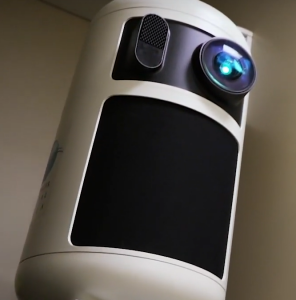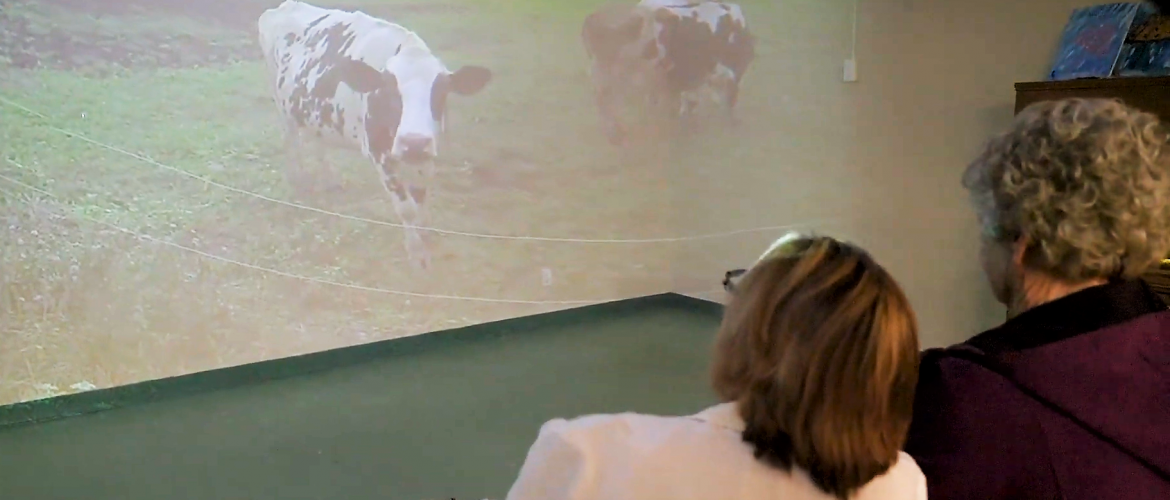It only takes a moment for Alan Scott to see the positive impact a virtual reality (VR) experience has on his wife Beverly. The experience, courtesy of the albert project™ – a VR application designed for people living with dementia – helps Beverly, and by extension her husband, feel at ease.

The albert project uses Broomx technology to give older adults an immersive virtual reality experience.
The goal of the project is simple: to improve the quality of life for people living with dementia, their family members, and caregivers through VR technology. And it’s working, says Alan, who agreed to trial the technology at Henley Place, a Primacare Living Solutions long-term care residence, last year.
“Before the project started, Beverly would have these really rapid highs and lows…she would almost be in a panic,” notes Alan. “Those highs and lows aren’t there anymore, which is really nice to see.”
Depression, agitation, and even aggression are common behaviours in people living with moderate to severe dementia.[i] Watching loved ones go through these experiences can leave family members feeling helpless. The project aims to mitigate these behaviours and offer alternative solutions to dementia care that focus on reducing the use of pharmaceuticals.
The Centre for Aging + Brain Health Innovation (CABHI), powered by Baycrest, matched media content company, Crosswater Digital Media, and Primacare Living Solutions together to test and validate the VR technology in a real-world setting. Through CABHI’s Industry Innovation Partnership Program (I2P2), the project has received funding to carry out evaluations in three long-term care facilities across Ontario with up to 325 participants.
Participants are given the opportunity to enter the VR experience through a machine called the Broomx. When activated, the Broomx projects an immersive image on to the walls and ceiling, transforming an empty room into a lush green park or the heart of a bustling city.

The albert project immersive virtual reality experience.
The benefits of VR are promising, explains Jill Knowlton, one of the project leaders and Chief Operating Officer at Primacare Living Solutions. “We saw a reduction in the use of medication, agitation, and depression,” she says. “Residents who would pace as the nurses tried to give them a sandwich now sit and are much more settled.”
The experience has helped Kay Punter, another participant in the study, relive some of her most valuable memories.
“From day one we could see her interaction with the pictures on the wall, especially when they would show pictures of London, England,” explains her daughter Monica. “She saw things and would say, ‘I remember that!’”
Part of what makes the experience so unique is its musical component, says Armin St. George, project lead at Crosswater Digital Media. “Music plays such an important role in our lives and it stimulates us in ways that we don’t even understand,” he adds.
“In long-term care, you don’t always get the opportunity to explore different approaches. CABHI really acted as an incubator for these ideas to develop.”
The project’s customizable experience not only benefits participants, but their family members and those involved in their care as well. It also has positive implications for the broader health care system. Alternative solutions to dementia care, like VR technology, mean less reliance on medication and costly one-to-one staffing programs. Primacare Living Solutions has already noticed a 30 percent reduction in the use of psychotropic medications to treat responsive behaviours in their residents.
Another unique aspect of the project is the merging of long-term care practices and technology, something Knowlton would like to see continue. “In long-term care, you don’t always get the opportunity to explore different approaches,” she explains. “CABHI really acted as an incubator for these ideas to develop.”
When she thinks about the future of the project, Knowlton is hopeful it will add a fresh approach to dementia care. “We’ll be working with CABHI to commercialize this, so we don’t create local pockets of innovation,” she says.
St. George is also looking forward to the way VR will support the broader health and home care industries, adding that with CABHI’s support, he hopes to make the VR experience more accessible and affordable for everyday use.
Watch this video to learn more about how this CABHI-funded project helps improve the quality of life for people living with dementia:
[i] Dementia| https://www.mayoclinic.org/diseases-conditions/dementia/symptoms-causes/syc-20352013


